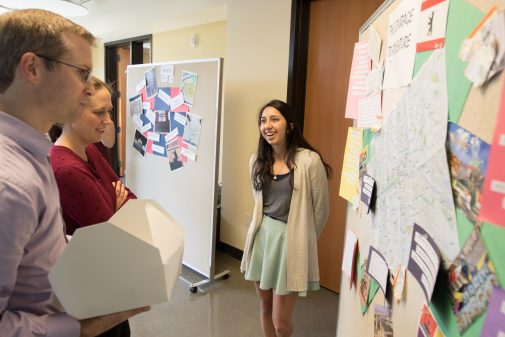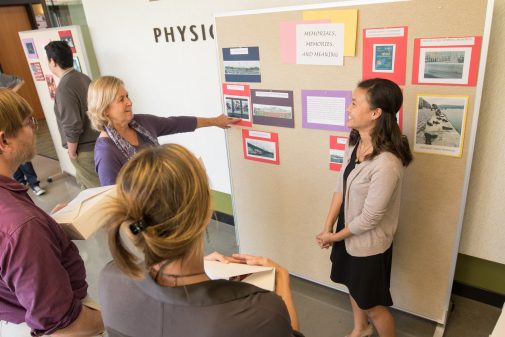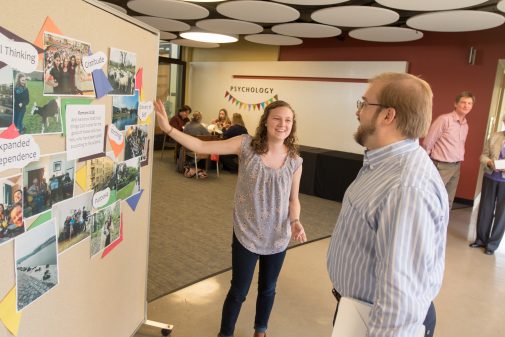Westmont in Northern Europe Breaks Walls
By
Westmont

The husband-and-wife teaching team Chris Hoeckley and Cheri Larsen Hoeckley travel this month to co-direct Westmont in Northern Europe (WNE), a semester-abroad program they launched last year to explore conflict and peacemaking. Westmont in Northern Europe is different from Westmont’s Europe Semester, which began in 1969.
Chris, assistant professor of philosophy and director of the Gaede Institute for Liberal Arts, and Cheri, professor of English, will lead 22 students. They begin Aug. 30 in London, where WNE will stay for three weeks. They will spend the majority of the semester in Berlin, including a three-week homestay in a German household. The semester ends with four weeks in Rostrevor, Northern Ireland. The semester includes weekend excursions to Belgium, Slovakia and Austria.
Chris and Cheri will teach several courses, including Philosophical Reflections on Conflict and Peacemaking in Modern Europe, Studies in World Literature, Encountering the Cultures of England, Ireland and Germany, and Exploring Wellness. Students will earn foreign language credits while studying German at the German Language School in Berlin.

Students from last year’s WNE program discussed important lessons from their semester abroad Feb. 5 at a poster session, “One Big Idea.”
“I wrestled with ideas about the rhetoric of war and how people in power can minimize, play down and oppress minorities to secure their own positions of power,” says senior Jordan Ellis, who focused on “The Power of Naming an Enemy.” Before attending WNE, Ellis never considered how propaganda can affect society’s bias. “It forced me to imagine our own enemies, as well as who’s telling us who our enemies are, and say, ‘Wait a second, have they actually warranted being our enemy?’”

Junior Mackenzie Frambes also gained a broader perspective in determining who the enemy is. She explained how the walls in Ireland, dividing Protestants and Catholics and the British and Irish, were not only physical structures, but “internal walls built from the fear of moving beyond their past to live into the future,” she said. While the two sides of the wall are currently at peace, seeing the wall made Frambes think twice before labeling others and making sure she understands the full story. “I got to look into my life and see where my walls are and how I’m influenced by things around me,” she says.
Senior Karis Kirchgestner, an extrovert who isn’t afraid to share her story, discovered how difficult it can be for others to open up. “Often times in America, we are excited about telling our story, but we often don’t listen,” she says. “We just talk and talk. On WNE, we met this woman who lived on the east side of the wall in Ireland. She had never shared her story in 25 years because she didn’t think it was important or that anyone cared. But we cared enough to listen to her story and she cried and was overwhelmed. It was cool to be a part of the fruition of that story.”
Redefining love and understanding what Jesus meant when he said to love our neighbors as ourselves was a big takeaway for senior Chad Sykes. Sykes learned three ways to love well: listen to other people’s stories, don’t force your ideas on others, and love unconditionally. “I was able to apply these to topics and events happening in America, such as Ferguson, homosexual marriage, how we view enemies in a military context and pacifism, and I considered where the church should be in all of this.” Sykes is excited to participate in the Westmont Center for Social Entrepreneurship program where he will be able to work with social responsibility and apply what he has learned while studying abroad to Westmont’s community on campus.
Junior Tyler Salinas says he realized Americans tend to almost unconsciously subcategorize themselves every day, first by their ethnicities and second by the title of American. “I really want people to start focusing on common ground, first calling themselves American and then categorizing themselves by their ethnicity,” Salinas says. “So that when anyone in political power wants to depict a group as the enemy to gain followers and power, people are more resistant and the conflicts are either lessened or might not happen at all.”
Filed under
Academics, Admissions, Alumni, Faculty and Staff, Featured, Press Releases, Student Stars